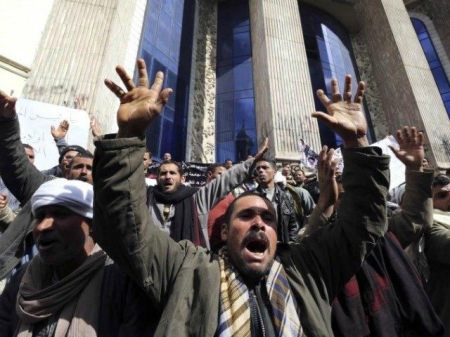Egypt: Christian convert murdered by Muslim family over Facebook post

A Christian convert in Egypt was killed by his Muslim family after he publicly confirmed his newfound faith in a Facebook post, according to the persecution advocacy group International Christian Concern.
The U.S.-based nonprofit reported last Wednesday that Hussein Mohammed, who preferred to be called by his baptismal name George, was killed on Oct. 6 after he posted several photos to his Facebook account confirming his Christian faith.
George’s family learned about his conversion before the posts were made, and his uncle filed complaints with the Directorate of Security. However, the Facebook post was a “public acknowledgment of his conversion,” notes ICC. It included a photo of a cross tattoo that George got on his wrist, a common practice of Egyptian Coptic Orthodox Christians.
The murder comes as Egypt ranks as the 16th-worst nation in the world when it comes to Christian persecution, according to Open Doors USA's 2019 World Watch List. Christians comprise about 10% of the Muslim-majority nation's population.
ICC notes that in Egypt, Muslims who convert to Christianity are viewed by the Islamic community as apostates, which means that the public discovery of their conversion makes them vulnerable to being a victim of an honor killing.
According to the Honor Based Violence Awareness Network, honor killings are “on the rise” across Egypt. While the practice is against Egyptian law, judges often view such cases with leniency.
“Islamic culture fuels religious discrimination in Egypt and creates an environment causing the state to be reluctant to respect and enforce the fundamental rights of Christians,” Open Doors says.
“Though President el-Sisi has publicly expressed his commitment to protecting Christians, his government’s actions and extremist groups’ continued Christian persecution attacks on individuals and churches, leaving Christians feeling insecure and extremely cautious.”
Egypt’s Christians are also susceptible to the country’s harsh blasphemy laws. According to the United States Commission on International Religious Freedom, most blasphemy laws are “vaguely worded” but carry “unduly harsh penalties for violators.”
Social media apps like Facebook are the latest tool used by Islamic extremists to accuse Christians of blasphemy, according to Open Doors.
In July, it was reported that a 26-year-old Christian man named Fady Youssef Todary noticed someone had hacked into his Facebook account and posted a blasphemous message. Later, after realizing what had happened, he posted a video on the platform explaining to his followers that it wasn't him who produced the content.
Nevertheless, an angry mob of roughly 100 people had already formed and destroyed everything inside Todary’s family home in Ashnin El-Nasara, a village in Minya, south of Cairo. Fady’s parents were forced to flee their son's home and seek refuge at a relative’s residence.
Just a few days later, Todary was arrested, along with his 19-year-old brother and two uncles. He has since been released but is awaiting trial on blasphemy charges.
Open Doors warns that what happened in Ashnin El-Nasara isn’t an isolated incident and said the emerging trend is a “real cause for concern.”
In December 2018, an Egyptian court sentenced a Coptic Christian to three years in prison after he was found guilty of “insulting Islam in the first degree” in a Facebook post.





















